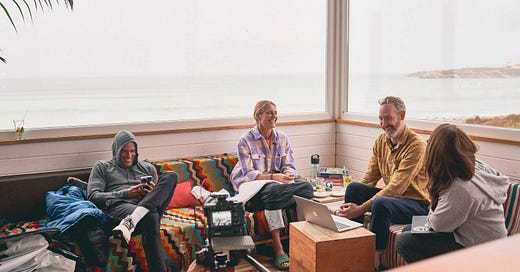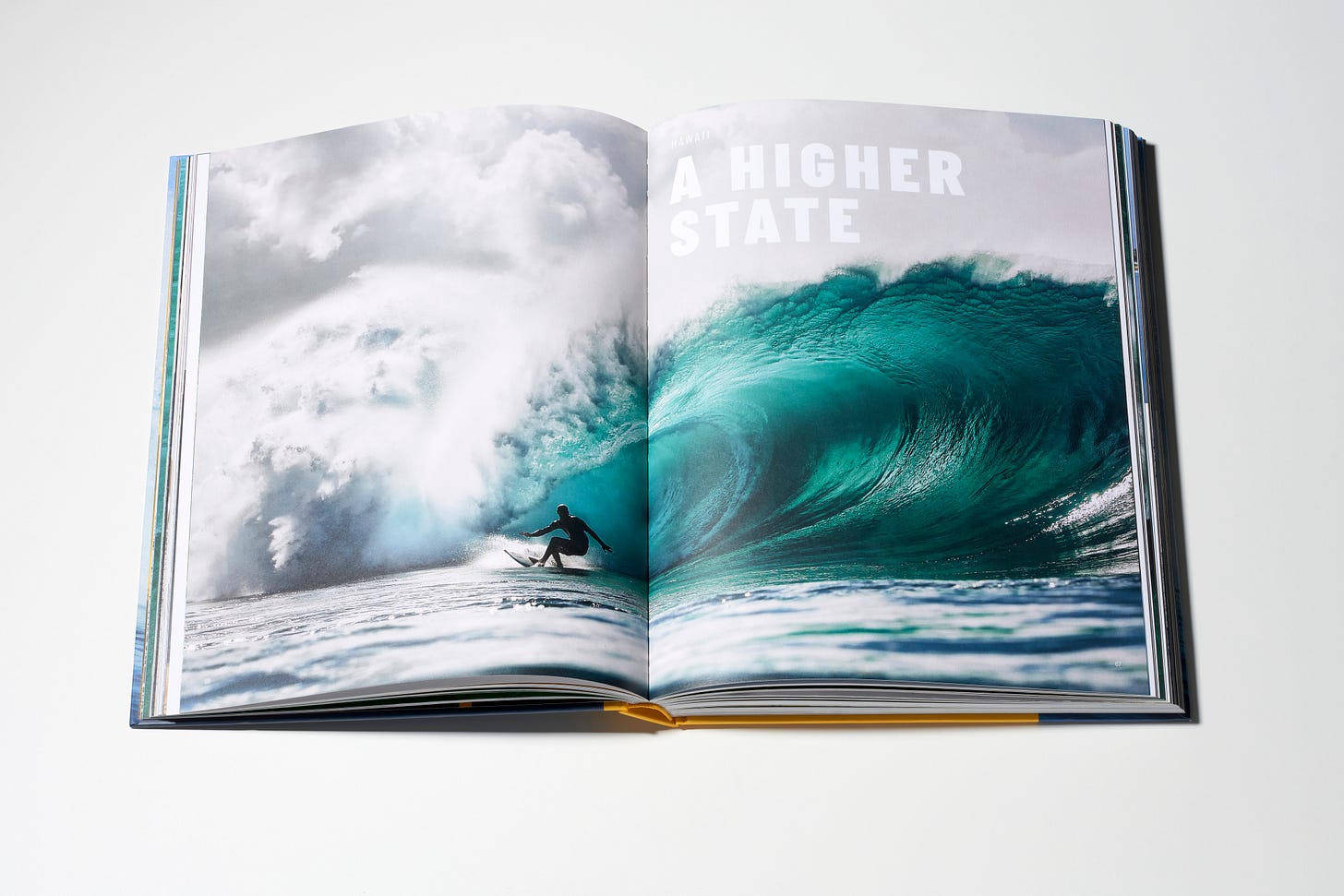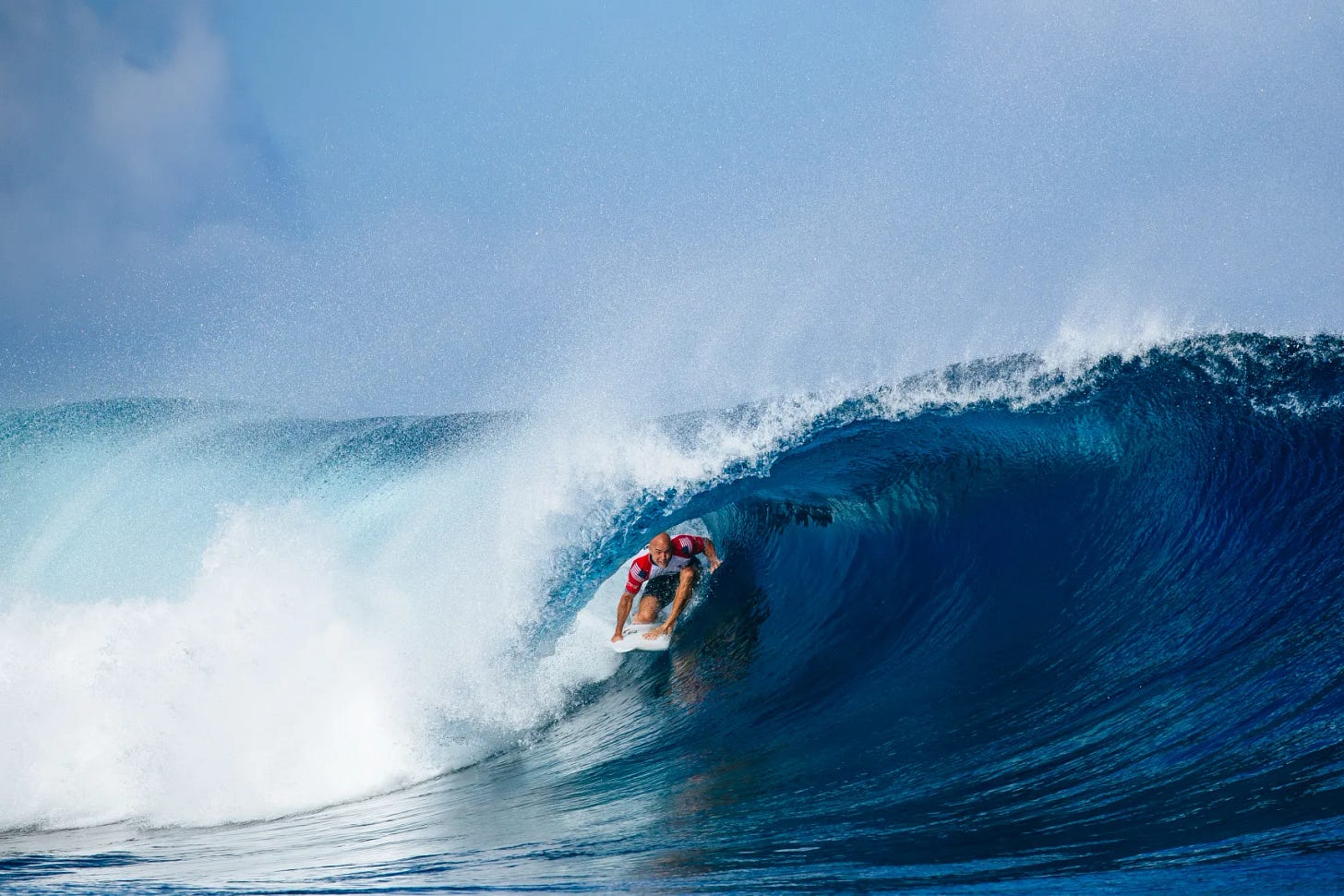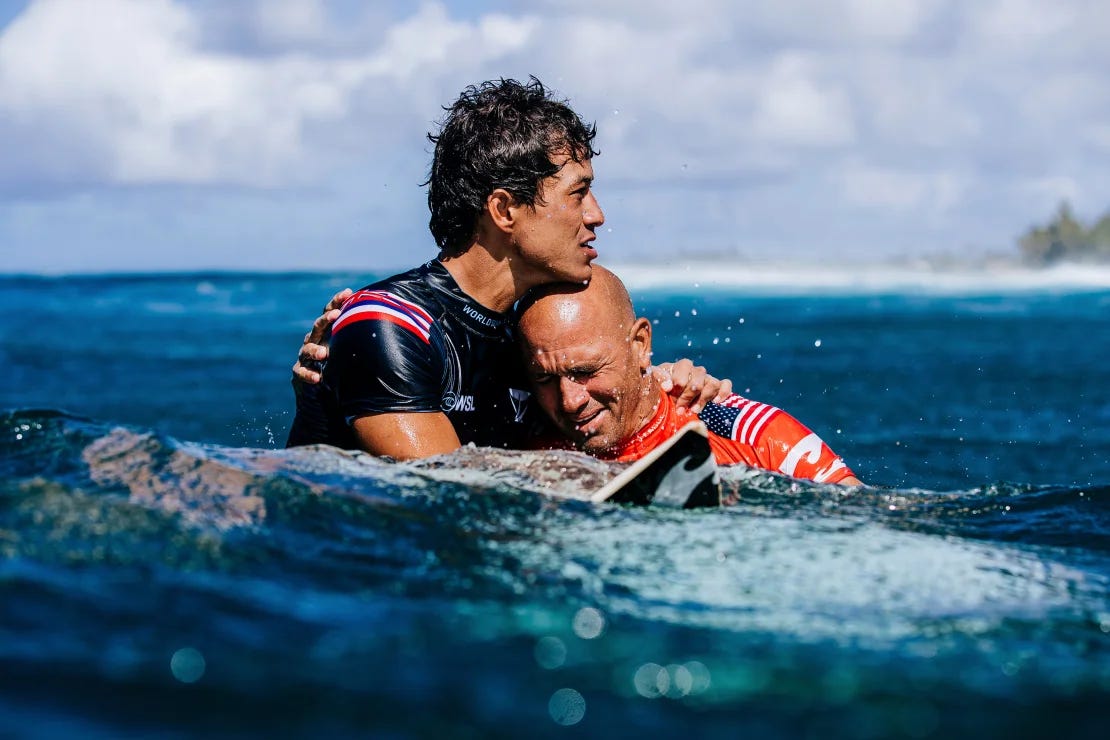Surf Bugle Exclusive: Kelly Slater In Conversation
"I remember being probably in kindergarten and realising “I think I'm a surfer. I think that's my thing”.
Kelly Slater has, officially, retired. No, this time for real. His early round loss in the Fiji event means his competitive road has finally run out. Aged 52, with 11 World Titles, and 34 years after he claimed his first, the GOAT has left the building.
I've followed Kelly's career since the start, first as a fan, and professionally for the last 25 years. I've interviewed him a dozen times, had dinner with him a couple of times (in big group, not a date night scenario), and "borrowed" his legrope once. The last time we caught up was in Portugal, in April 2023. My interview with him would feature in his profile in The Breitling Book Of Surfing. Which is a great Xmas present, and even better door-stop.
But much of our hour-long chat didn't feature in the book. And seeing I felt it was one of our more candid and revealing conversations, where he touched on community, line-up hierarchy, Kirra, Florida, childhood trauma, friendship. Mayan culture, surf culture and what it means to be a surfer, I thought it was a read.
Ben: (Looking out on a packed Portuguese beach full of surfers). There’s a lot of surfers in the world, huh, Kelly.
Kelly: There’s so much interest in surfing. Somebody told me a statistic that during COVID the surfing population went up like 30% in Australia. You could go to the beach, but you couldn't go to work. Golfing and surfing went way up during COVID. I mean, I think people can visually see what a great sport surfing is. And then when people catch on that you can travel around the world to the best locations on Earth to go catch waves, and that's really fun, too. They start to go “Oh, I see”, and I think surfers figured this thing out about 70 years ago.
How has your love for the sport, the actual physical act of surfing, changed?
For just the surfing aspect?
Yeah, surfing itself as an act.
I remember being a kid and starting to surf. You know, I played other sports. I played football, baseball and basketball, but it wasn't how I identified my life path. And then I remember being probably in kindergarten and realising “I think I'm a surfer. I think that's my thing”. And then I started wearing the clothes. I had surf brand socks and OP on my shirt. And then I felt I was part of this tribe, I was a part of this thing.
You talk about identifying as a surfer. Why did you think it struck you so hard?
At that time, I still felt like an outsider as a kid. And the beach where I grew up had some of the best surfers from Florida. Pros like Matt Kechele and Charlie Kuhn were from my local beach. Everyone surfed this one beach. And it just seemed like this mysterious, mystical adventure to me in some way. I’d look at surf magazines of waves and distant lands and imagine going to that place one day. Just once in a while, we get a nice clean wave in Cocoa Beach that maybe, on a big day, was head high or something. And sometimes, till about 10 or 11 am, it’d be glassy in the summer when there's no wind. I would just sort of dream about these glassy, perfect peeling tubes. Just something about it captured me and I just wanted to learn how to fit in with that energy and those patterns in the water. And, you know, then eventually, obviously, I started to compete and my results showed I was obviously a good surfer, a skilled surfer. And so then it went from just trying to be part of this thing to start trying to figure out how to master my own game and my craft.
And what was the role of those local legends of the sport where you grew up? I mean in each surfing community there is that same set-up.
Back then there was a real hierarchy and it's because the centre of our universe in Central Florida was Sebastian Inlet. And Sebastian was a very distinct wave. It was bigger and had more energy than every other wave around it because it bounced off this jetty and created a wedge. And so on the coast, it was always bigger because that wedge would come off the jetty and make the wave 50% bigger. And so there was always a little pocket of energy you could surf in Sebastian, even on the smallest days. They used to have the Stubbies Trials and the two winners got to go to Australia and surf in the trials of the main event of the Stubbies. And that's when I started hanging out with Matt Kechele. He was competing in that as a 20-year-old or something. He made the finals a couple of times. Pat Mulhern and Jeff Klugel, who became a tour judge, made the Final there. So it was kind of a launch pad for people. But the hierarchy in Sebastian was very distinct. There's a first peak and a second peak and kind of a third peak. On the first peak sat all the locals like Jeff Crawford, Lewis Graves, Dylan's dad, the Kecheles and Kuhns and Mike Tabeling. There was a thick crew of really good surfers. So the order was based on your age, time spent there and the quality and intensity of your surfing. It was an equation of all those things. I could never as a 12-year-old or 14-year-old kid get one of the set waves. That didn't happen. Now you got guys out there pushing their six-year-olds on the best wave of the day. Because they're a face on the lineup they can take that wave for their kid. I just think it's bullshit, you know.
Why?
I think you need to earn your keep in the lineup. And that has a way of humbling you and putting you in the right place. And so when you do get that priority, it's earned over years of friendships, of putting your face in that line-up and time in the water and paying your dues with other people. And so I think there's something a little bit lost there nowadays. And Sebastian is no longer really a wave. It's filled in with sand, it's quite shallow outside and the wave doesn't break in the same place. I mean, everyone goes “Kirra was better when…” I mean Sebastian was a better wave. Physically. Whereas like, you know, I would argue against Kirra all day long because the Super Bank has provided so many more great waves. And Kirra was only good once in a blue moon. So I'm not just living in a fantasy world of the past. Sebastian was a lot deeper behind the break. People who fish off the end of the jetty in the old times versus now, tell me that. “You know, when I was a kid, it was about 30 feet deep in that spot. And now it's about 15 feet deep.” And the beach has moved out about 50 yards. And the jetty has a turn in it, so now it actually wedges incorrectly. So that was the change in the landscape, but the hierarchy kind of disappeared with the wave. Because that was the centre of where everyone surfed together. Now it’s just spread along the coast anywhere that breaks. So you don't really have that same kind of camaraderie and building off each other, and that kind of fire in the water too.
How important is that sense of camaraderie and that sense of community? Where do you get that now? Is that something that exists?
You can find it in lots of different spots around the world but I don't know if I’d necessarily put Snapper in with that or Superbank because it's just a free-for-all. I would say that's an unfortunate and beautiful thing that's happened there. You know, we now have one of the greatest waves of all time anywhere in the world but it's just got no order, it’s complete chaos. That being said, you still see Joel, Mick and Dingo on the best waves. And when Wayne Dean was around I’d see him on the best waves. He could get whatever wave he wanted. So I think the guys who have grown up and lived in a certain place, I think they have the right to that. It's like a bear in the woods. Like, “You're in my territory.” That's my female bear, and that's my food. You think you're going to steal my salmon? No way!" (Laughs).
You move around a lot. Where do you call home, or a better question, where are you able to plug into a community?
I have pretty tight communities around the world. I have family almost everywhere I go. Down at Bells, I've stayed with the Greens for 25 years. Alan was my boss at Quik. His wife Barb is like a second mom to me. On the Gold Coast, the Munros are like a family, I’ve lived with them and watched their kids grow up. In Hawaii, every single day I see people I've known for 30-plus years. With Florida, I still consider it my home. It's where I really feel like I can unplug. And I don't necessarily surf a lot, but I'll go surf with my old buddies, and guys I grew up with and I feel like I get a little practice in. We kind of even spark a little competitive fire. I grew up with a guy named Dave Spears, who was a really good surfer. Dave and I battled as kids. We were best friends, but also our biggest rivals as teenagers. And we recently went and surfed at the beach in front of the condo where he grew up. And when we were kids, we named these two sections, these little rip banks, for some reason they were really distinctive this one season. We called them SB one and SB two. Sand Bar One and SandBar Two. And we recently took the bikes on the beach, me and him, and those two peaks were forming again. Yeah, so he and I went out and just surfed on our own. We were reliving our childhood again in some way. And we took the bikes for a couple of miles up and down the beach looking at peaks and different waves we wanted to surf.
It’s interesting to go through all you've achieved, to go back and ride a bike with a mate and surf a rip bank on your own still gives you so much joy.
I can still get as psyched for good two-foot waves in Florida as I can for 10-foot Pipe and Backdoor. It's not the physical thing, it's the emotional exchange and joy of the situation.
That must be one of the keys to success then, being able to have that ability to do that. Surely that must be a part of why you've been successful in surfing for so long? If that goes, you're in trouble, right?
Yeah definitely, but I also give a lot of respect to all the friendships I've had around the world. I have a lot of really close friends. Like, I think I probably have as many close friends in my life as anyone else in the world. All over every continent and every country that I’ve been to.
And what do they all share in common? Is surfing the common thread?
No, not always. I mean, a lot don’t surf. All the friends who I grew up with don’t even surf at all. But with a couple of them… like one of them's a best buddy, like a brother, he lived with us for a while. Me and him are just super competitive with everything. We like to play video games, go bowling, drive go-karts and just do loads of stupid stuff. Playing horseshoes, betting money, tennis and ping pong. On my birthday we would have a contest where we'd play as many sports as we could in a day and add them all up and see who owed each other millions of dollars.
And that competitive streak, it's still there in your surfing?
I've made no qualms about it. That candle is burning out. I'm starting to really enjoy my free surfing in my free time. I was saying to somebody yesterday that when surfing is your whole world, that's it. And you're trying to earn your keep and find your way and get contracts and go to new places around the world, you know. It's all exciting and it's real easy to put the energy in. As you get established and have success and stuff, you can live off that experience and feed off that high that you get and learn to relive it and live in that for a while. But, you know, for me, I have homes around the world and businesses that I work on. I have a daughter who just got married, I have different priorities in my life now. And I've always said that the reason I did so well was because I didn't start a traditional family, get married, have kids, or have a job. I didn't have that same pressure or distraction or whatever. It’s not a negative thing. But you know, I just didn't have it the same way as other people. And that was by design. I had a lot of ambition to compete and try to be the greatest competitor I could be.
Did that come with a personal cost?
I mean I don't know. You're talking about what never was. I've chosen to live the life that I wanted to so far. I think what you give up in excitement, you make up in stability maybe somewhere, in relationships and things, but you can have a bit of both. And I've tried to do that.
It’s impossible to have it all, right? Everything has an opportunity cost.
Well, yeah I mean and then you get into psychoanalysing yourself, and then that’s a whole can of worms.
Yeah, maybe we don't want to go there.
Well, no, it's good to reflect, but I don't know that there was some life that I could’ve lived, that was better than the one I had. The one I missed out doesn’t exist.
Yeah, well, the life Kelly Slater has led has been fairly remarkable.
I definitely went through a lot of just traumatic stuff as a kid with friends and family and relationships. A lot of stuff with my dad. And that drove me to want to compete and focus all my energy. In a way, it let me keep my mind somewhere else. Maybe it gave me time to heal inside or something. Everything you do is, whether you are conscious of it or not, a lesson. It turns you into the person you are and makes you aware of the things you know. And so, I mean, I don't think there's a person on this earth that wouldn't say, “There's one or two things I'd like different in my life. I'd like to know more of this. I'd like to have done a little more of that”. But I can't complain. I’ve had a pretty good run.
Absolutely. And away from the introspection, where do you think surfing’s at in terms of culture? What place is it in 45 years after you first identified as a surfer?
I think it's a little bit rudderless right now. Because the surf brands are starting to be bought up by big conglomerates and they're not running the grassroots they were. It's the same thing with the contests. I think, although it could have been more professional when they were run by the surf brands, you know, the Gotchas and Billabongs and Quicksilvers and Volcoms and Ripcurls. Maybe there wasn't as much of a bigness or largeness around the world, or visibility. But there's something really great about the core of surfing. All those brands were created by surfers, for surfers. I know that was a tagline for one of the companies, but they're all that way. Like Rip Curl was made by some guys at Bells that needed wetsuits. And the same thing for Quiksilver for surf trunks. And then there was a time when all of them kind of had their own distinct thing, but then they all started making everything. I think there's been a big change when Quicksilver started making wetsuits when Ripcurl started making clothing. And then when all the brands started getting into like snow and skate and all these different things. It starts to water down the essence of the one thing. And now I think people are getting into surfing. They know these brands came from surfing, but because they didn't grow up and know them, they see them as a past symbol of surfing. But they’ve all been washed or hollowed out. They don’t have the authenticity. Maybe the goal should be just to do one thing, but do it very, very well.
It could be said that's what you have done in surfing. Was it a singular purpose?
Do you remember recently when the Mayan calendar was supposed to be running out? Maybe in 2020?
I missed that memo.
I had a look into it, and with Mayan culture, everyone was born with a purpose. As they grew up, they grew into that purpose. They didn't feel more or less, no matter what their thing was. They would help the community with that purpose. So each individual really felt a part of the grand scheme. And it just reminded me of that when you said about a singular purpose.
Maybe your purpose was to be a surfer Kelly?
Maybe, maybe. Or I'll find out somewhere down the road, when I study my Mayan numbers that I was supposed to be like a farmer or a taxi driver. Maybe I’ve been getting it wrong all these years.







